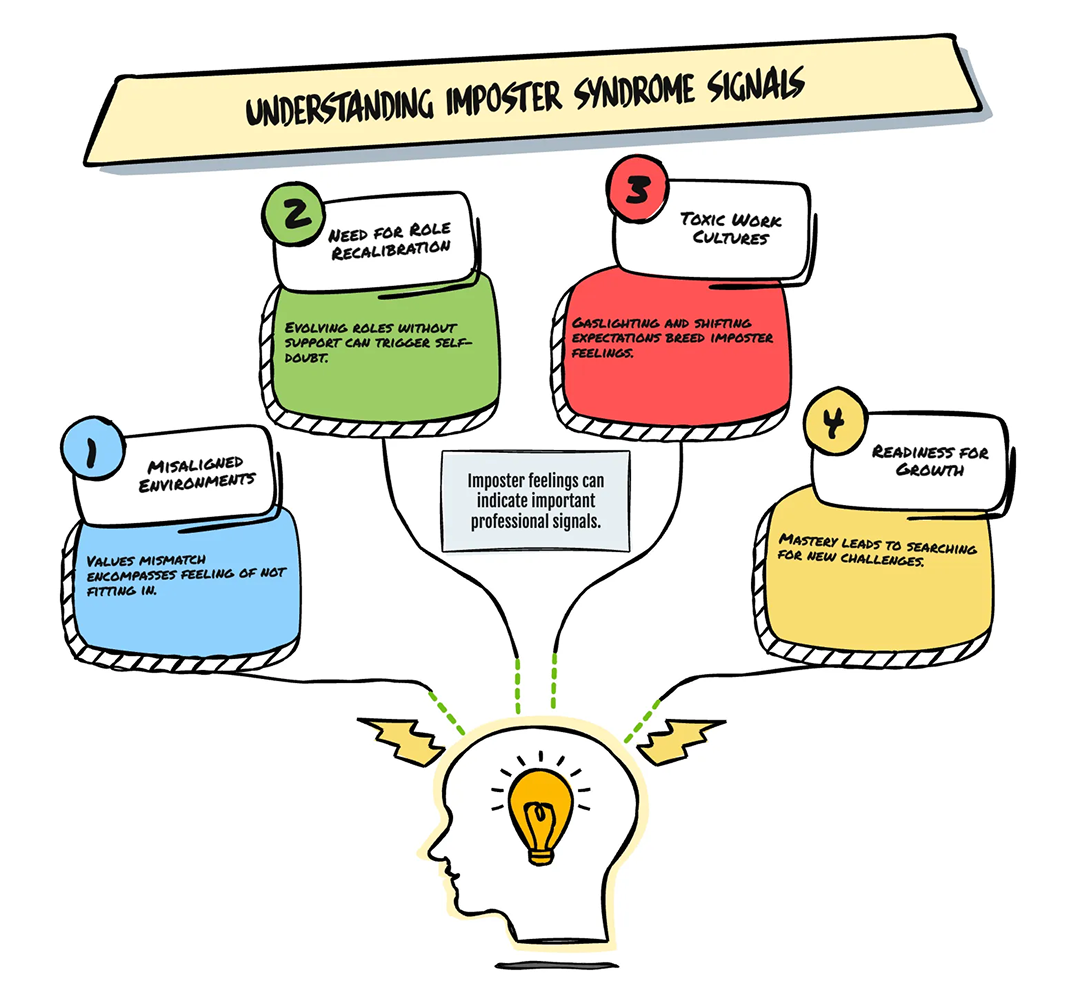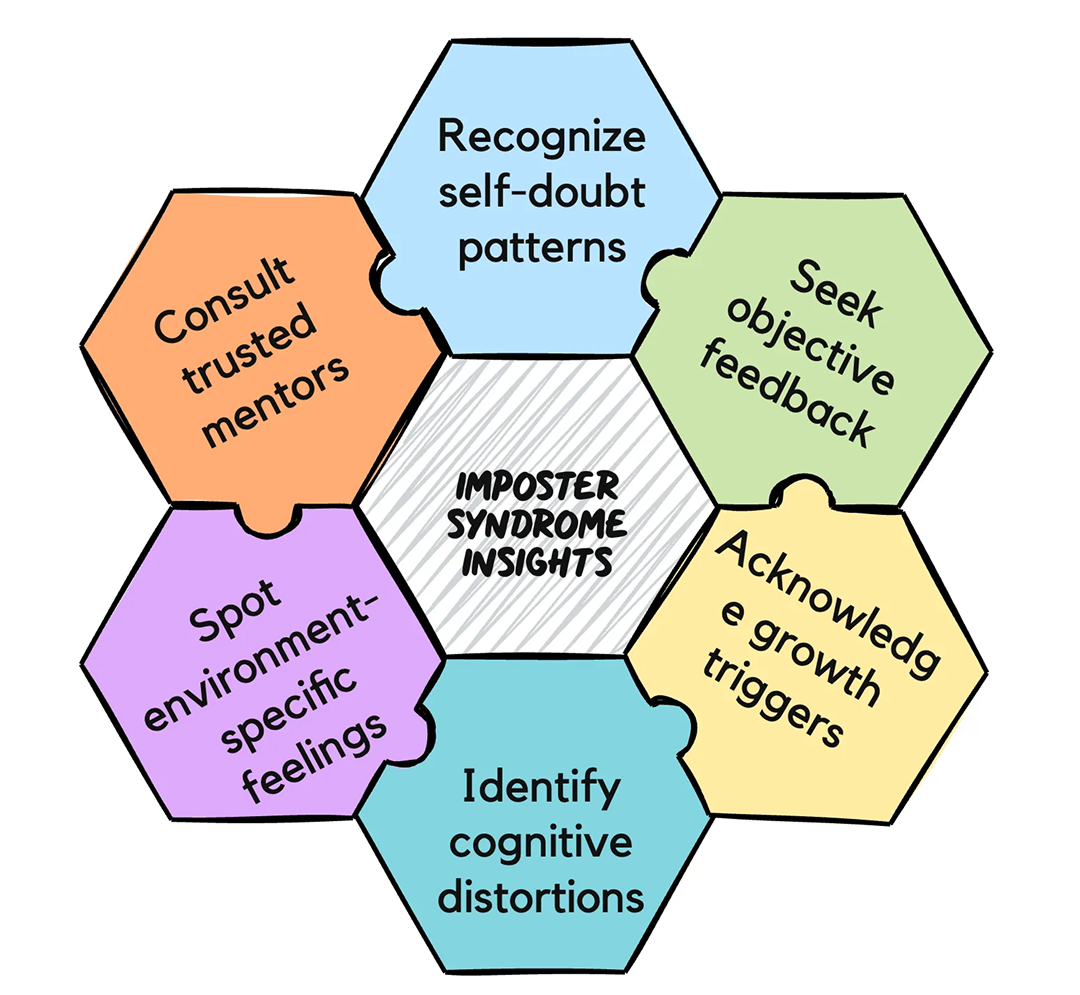ALorem ipsum dolor sit amet, consectetur adipiscing elit. Maecenas eu porta tellus. Mauris sit amet efficitur velit, vitae mollis ipsum. Cras a facilisis sem, vulputate accumsan diam. Praesent molestie, mauris nec dictum condimentum, sem metus lobortis orci, vitae auctor nunc ante et nunc. Phasellus dui ligula, hendrerit eget urna sed, porttitor sagittis libero. Nam tempor felis quis erat imperdiet pulvinar. Aenean euismod vitae nibh eu pretium. Cras quis elementum risus, nec ultrices felis. Nulla aliquet elementum erat et finibus. Quisque aliquam quam ultrices nibh congue sollicitudin
That familiar feeling creeps in again. As you sit in the meeting surrounded by colleagues, the thought surfaces: "I don't really belong here. Soon everyone will realize I'm not as qualified as they think." Your heart beats faster as anxiety mounts—classic imposter syndrome making its unwelcome appearance.
Conventional wisdom tells us to recognize these thoughts as irrational fears, to push past them with positive affirmations and evidence of our accomplishments. And often, that's exactly the right approach. But what if sometimes—just sometimes—these uncomfortable feelings are actually trying to tell us something important?
"Not all discomfort is imposter syndrome. Sometimes it's your intuition sending valuable signals that shouldn't be dismissed."
Before automatically filing away your self-doubt as imposter syndrome, consider whether these feelings might contain useful information that deserves your attention.
Self-doubt exists on a spectrum. At one end lies clinical imposter syndrome—the persistent inability to believe your success is deserved despite clear evidence of your competence. At the other end are intuitive signals that something in your professional situation genuinely needs attention.

Here are five scenarios where what feels like imposter syndrome might actually be valuable feedback:
That constant sense of not fitting in might not be imposter syndrome at all, but your intuition recognising a legitimate values mismatch. When organisational culture contradicts your core values, discomfort serves as an important signal.
The Signal: You feel like an imposter not because you doubt your abilities, but because you're suppressing your authentic professional self to conform to an environment that doesn't align with your values.
Questions to Consider: Does pretending to be excited about company priorities feel exhausting? Do you find yourself regularly compromising personal values to fit in? Do you feel you have to be a different person at work than in the rest of your life?
Sometimes imposter feelings arise because your role has evolved beyond its original parameters without proper acknowledgment, training, or compensation.
The Signal: You feel out of your depth because your responsibilities have expanded into areas where you genuinely haven't been properly equipped or supported.
Questions to Consider: Has your role changed significantly since you were hired? Are you regularly expected to perform tasks that weren't in your original job description? Have you received appropriate training and resources for your evolving responsibilities?
In environments where gaslighting, shifting expectations, or arbitrary criticism are common, imposter feelings aren't irrational—they're a natural response to unpredictable external validation systems.
The Signal: Your self-doubt stems from working in conditions where the measures of success are constantly moving or where recognition is withheld as a control mechanism.
Questions to Consider: Do criteria for success seem to change without warning? Is criticism delivered destructively rather than constructively? Do you notice patterns of promising recognition but never delivering it?
Sometimes feeling like an imposter indicates you've mastered your current role and are ready for new challenges—your mind is signaling readiness for growth by becoming increasingly aware of what you don't yet know.
The Signal: Your discomfort stems not from incompetence but from having outgrown your current position and being ready to expand your capabilities.
Questions to Consider: Do you complete most tasks without much challenge? Are you more interested in what's happening at levels above yours? Has your learning curve in your current role flattened?
The disconnect you feel might be signaling that your work doesn't align with your sense of purpose, creating a feeling of fraudulence as you go through motions that don't engage your deepest motivations.
The Signal: You feel like an imposter because you're investing energy in work that doesn't connect to what you find meaningful, creating a sense of playing a role rather than expressing authentic professional purpose.
Questions to Consider: If salary were removed from the equation, would you still choose this work? Do you find yourself having to manufacture enthusiasm for projects? Does talking about your work's impact feel empty?
How can you tell when to work through imposter feelings versus when to listen to them? Consider these differentiating factors:
Pattern Recognition: True imposter syndrome tends to follow you across different environments and roles. If your self-doubt is specific to your current situation rather than a lifelong pattern, it might contain situational intelligence.
Physical Responses: Notice your body's wisdom. Does challenging the imposter thoughts bring relief? Or does it create a sense of internal conflict? Physical tension when trying to dismiss imposter thoughts might indicate they contain valuable information.
Growth After Addressing: When you address true imposter syndrome through therapy, coaching, or self-development, it tends to diminish. If your feelings persist despite these interventions, they may be signaling something in your environment that genuinely needs attention.

If you've determined your imposter feelings contain valuable information, consider these approaches:
For Misaligned Environments: Rather than trying to fit yourself into a mismatched culture, identify organizations whose values and approach align better with your authentic professional self.
For Role Calibration Issues: Initiate a conversation about your current responsibilities, seeking either appropriate training, adjusted expectations, or compensation that matches your actual contributions.
For Toxic Cultures: Document patterns of problematic behavior, connect with others having similar experiences, and develop an exit strategy while protecting your confidence and wellbeing.
For Growth Readiness: Propose new challenges within your organization, seek stretch assignments, or consider roles that will push your development in directions that engage your interest.
For Meaning Disconnects: Reflect on when you've felt most fulfilled professionally, identify the elements that created that sense of purpose, and explore roles that incorporate those elements more centrally.
Learning to distinguish between true imposter syndrome and valuable intuitive signals represents an important professional skill. By developing this discernment, you transform uncomfortable feelings from something to be dismissed into potentially valuable data about your career path.
This doesn't mean abandoning strategies for addressing genuine imposter syndrome. Rather, it suggests first asking whether your self-doubt contains useful information before automatically categorizing it as irrational thinking to be overcome.
The most successful professionals develop the ability to both challenge unwarranted self-doubt and listen to the wisdom that sometimes resides within discomfort—knowing when to push through and when to pay attention to the important signals their intuition provides.
At WCFC Academy, professionals learn to distinguish between limiting imposter syndrome and valuable intuitive signals that inform authentic career development. Their strength-based approach helps identify which aspects of professional discomfort should be worked through and which contain important guidance for career alignment. Book your Career Clarity Session today to transform self-doubt from an obstacle into a navigational tool for your professional journey.
“Raesent molestie, mauris nec dictum condimentum, sem metus lobortis orci, vitae auctor nunc ante et nunc ligula”



Your potential is infinite. Our mission is to activate and unleash it in the right environment.